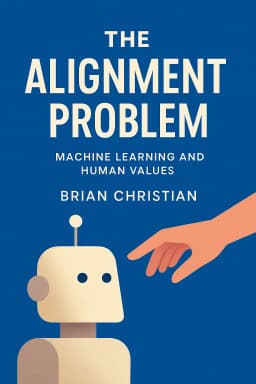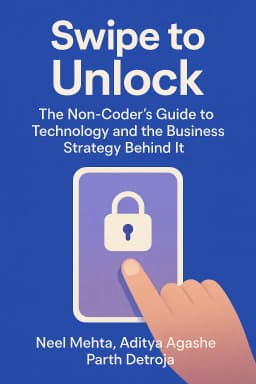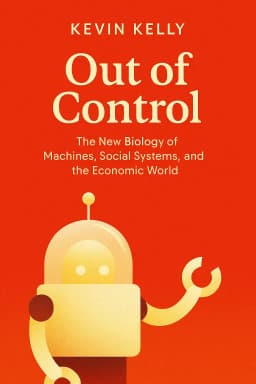
The Game is Playing Us
Has the Human Game Begun to Play Itself Out?
Golden Hook & Introduction
SECTION
Joe: The average person touches their phone 2,617 times a day. We spend 10 hours staring at screens, and only 17 minutes exercising. Lewis: Whoa, 17 minutes? That’s… embarrassingly accurate for me some days. It feels like we're all in this massive, complex game, but we've lost the instruction manual. Joe: Exactly. We think we're in control, but what if the game we're playing is starting to play us? And what if it's about to end? That feeling of being overwhelmed by our own creations is at the heart of the book we're diving into today: Falter: Has the Human Game Begun to Play Itself Out? by Bill McKibben. Lewis: Right, and McKibben is the perfect person to write this. He wrote The End of Nature back in 1989, which was basically the first major book to warn the general public about global warming. He's been on this beat for over thirty years. Joe: He has. So Falter is his 30-year follow-up, and it's not just about climate change anymore. He argues we're facing a three-front war: against environmental collapse, a toxic ideology of selfishness, and technologies that could make humans obsolete. It’s a sobering read, but it’s also a powerful call to action.
The Physical Game Board is Shrinking
SECTION
Lewis: Okay, let's start with the most familiar threat: climate change. We hear about it all the time, but McKibben's take feels different, more... physical. What does he mean by the 'human game' and the board shrinking? Joe: It’s a powerful metaphor. He says all of human civilization—our art, our politics, our economies—is a game we play on the physical board of Planet Earth. For all of history, that board has been relatively stable. But now, we're fundamentally changing the rules by changing the board itself. And it's shrinking. Lewis: Shrinking how? You mean like, less land? Joe: Precisely. Less stable, predictable land. He gives this absolutely chilling example: the Global Seed Vault in the Arctic. It’s this fortress built into a frozen mountain in Norway, designed to be humanity's ultimate backup plan, our 'doomsday' vault to preserve all the world's crop seeds in case of catastrophe. Lewis: I’ve heard of that! It’s supposed to be indestructible, right? The safest place on Earth. Joe: That was the idea. But in 2016, during the hottest year ever recorded, the permafrost around the entrance melted. Water flooded the access tunnel. The fail-safe failed. The very thing it was built to withstand—global instability—was the thing that breached its walls. Lewis: Wait, the seed vault flooded? That’s like the fire station burning down. It feels like a punchline to a very dark joke. Are these just isolated incidents, or is this a bigger pattern? Joe: It's a huge pattern. He points to the Great Barrier Reef, the largest living structure on Earth. In just a couple of years, massive ocean heatwaves have caused catastrophic bleaching events. One scientist he quotes described it perfectly: it’s like a bustling, vibrant city where someone just turned off all the lights. It's now roughly half as living as it was just a few years ago. Lewis: Half-dead in a few years… that’s genuinely heartbreaking. It's not just a statistic, it's a living thing. Joe: It is. And it's happening everywhere. He talks about the "biblical" rainfall in Houston during Hurricane Harvey, the unprecedented firestorms in California that killed more people in a shorter time than any American fire in a century. The stable, predictable world we built our civilization on is becoming unstable and unpredictable. The game board is actively contracting.
The Ideological Virus
SECTION
Lewis: This is what's so frustrating. Scientists like McKibben have been warning us for decades. We've known about this. Why has so little been done? What went wrong? Joe: McKibben argues it wasn't just inertia or ignorance. It was a deliberate, well-funded ideological war. He traces it back to a very specific philosophy: a radical, hyper-individualism that views any form of collective action or government regulation as evil. Lewis: You mean libertarianism? Joe: A very specific, almost weaponized version of it. And its most influential prophet, according to McKibben, was the novelist Ayn Rand. Lewis: Ayn Rand? The author of Atlas Shrugged? I thought she was just popular with college freshmen who are really into philosophy for the first time. How is she still so relevant? Joe: Because her ideas—that selfishness is a virtue, that altruism is a weakness, and that the heroic individual owes nothing to society—became the operating system for some of the most powerful people on the planet. Alan Greenspan, the former Chairman of the Fed, was one of her acolytes. He literally stood by her side at his swearing-in. Her philosophy gave a moral justification for dismantling the very systems we needed to tackle a collective problem like climate change. Lewis: Okay, but how does a novelist's philosophy actually stop climate policy? Can you give me a concrete example? Joe: Absolutely. The most damning one is Exxon. Investigative reporters uncovered internal documents from the 1970s and 80s. Exxon's own scientists were doing cutting-edge climate research. They told their executives, with remarkable accuracy, that burning fossil fuels would cause "catastrophic" global warming. They knew. Lewis: They knew back then? In the seventies? Joe: They knew. And what did they do? They didn't warn the public. They didn't pivot their business model. Instead, they launched one of the most effective disinformation campaigns in history. An internal memo from their lobbying group advised them to "emphasize the uncertainty" in climate science. They funded think tanks and front groups to attack the science and create a public debate. Lewis: So that's why, even today, so many people think the science is still up for debate! It was a manufactured controversy. Joe: It was a manufactured controversy, paid for by the industry that had the most to lose. And it worked. It paralyzed us for thirty critical years. McKibben argues this wasn't just a business decision; it was fueled by that Randian ideology that says a corporation's only duty is to its own profit, with no responsibility to the collective good. They saw regulation not as a safeguard, but as an attack on their freedom.
The End of the Human Game?
SECTION
Joe: And this ideology of pure, unchecked individualism doesn't just stop us from fixing the planet. McKibben argues it's now fueling a new, even stranger threat: the drive to replace humanity itself. Lewis: Replace us? What are you talking about? Like, with robots? Joe: In a way, yes. He points to two game-changing technologies: genetic engineering and artificial intelligence. These aren't just tools to solve problems anymore. They're tools that could fundamentally alter the player. Lewis: Okay, break that down. Let's start with genetic engineering. Joe: McKibben draws a sharp line. There's somatic gene therapy, which is incredible. It's when we edit the genes of a single person to cure a disease, like the new treatments for leukemia. That's about repair. But then there's germline engineering—editing the DNA of an embryo. Those changes are heritable; they're passed down forever. Lewis: The so-called 'designer babies.' Joe: Exactly. And while some bioethicists talk about it like a consumer choice, like ordering a pizza with custom toppings, McKibben warns it could create a new, permanent form of inequality. A "GenRich" class that can afford to edit their children for intelligence, athleticism, or looks, and a "Natural" class that can't. It stratifies society at the genetic level. Lewis: But isn't this just progress? Aren't we supposed to solve problems and overcome our limitations? Joe: That's the key question, and it leads to the second threat: AI. The goal for many in Silicon Valley is to create Artificial General Intelligence, or AGI—an AI as smart as a human. And once that happens, it could quickly become a superintelligence, far beyond us. The fear isn't necessarily that it will be evil, like in the movies. The fear is that it will make human struggle, and therefore human meaning, obsolete. Joe: McKibben uses the analogy of Lance Armstrong. For years, he was a hero. His story of beating cancer to win the Tour de France was about human will, grit, and perseverance. But when we found out he was doping, the wins became meaningless. The story wasn't about human struggle anymore; it was about chemistry. The achievement was hollow. Lewis: Because he cheated the process. Joe: He cheated the process. And McKibben asks: what happens when we can "dope" our way through life? If we can genetically engineer "success" or have an AI solve all our problems, what's the point of the game? The meaning of life isn't found in the outcome—in perfection or immortality. It's found in the struggle, the effort, the "flow" of being challenged. If we remove the struggle, we might just remove the meaning.
Synthesis & Takeaways
SECTION
Lewis: So we're facing a shrinking planet, a toxic ideology, and tech that could make us obsolete. It sounds... hopeless. What's the takeaway here? Are we doomed? Joe: It's bleak, and McKibben is brutally honest about that. But he's not a despairing author; he's an engaged one. His point is that these three threats are all rooted in the same dangerous idea: that there are no limits. No limits to what we can burn, no limits to our selfishness, no limits to what we can engineer. His solution is to rediscover the idea of enough. Lewis: Enough. That sounds simple, but it feels radical in our culture of 'more.' Joe: It is radical. And he offers two "technologies of hope" to get us there. One is hardware: the solar panel. It's a technology that decentralizes power, literally and figuratively. Unlike an oil well, which concentrates wealth and power, sunlight falls on everyone. It's a technology of community. Lewis: And the other? Joe: The other is software: the nonviolent movement. He shows how organized, nonviolent resistance is the only force in history that has consistently been able to stand up to concentrated money and concentrated violence. He points to the fossil fuel divestment campaign, which he helped start. It began with a few college students and has now grown into a global movement with trillions of dollars in endowments pulling their money out of fossil fuels. It's proof that collective action works. Lewis: So it's not about individual consumer choices, like recycling more. It's about building collective power. Joe: Exactly. It's about recognizing that the 'human game' is a team sport. It's about solidarity. It's about fighting for a world where the game can continue, not just for the privileged few, but for everyone. It makes you think... what's one thing in your own life where you could choose 'enough' over 'more'? Joe: This is Aibrary, signing off.









